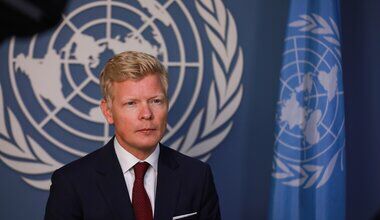
Positive Breakthrough Among Representatives of Yemeni Parties in Muscat Negotiations

Mwatana for Human Rights welcomed the announcement made by the office of the UN Special Envoy for Yemen, Hans Grundberg, on Wednesday evening regarding a positive breakthrough in the ongoing negotiations between the representatives of Yemeni parties in Muscat. These negotiations concern the release of detainees held due to the conflict in Yemen, including the politician Mohamed Qahtan, who is forcibly disappeared by the Ansar Allah (Houthi) group. Mwatana urged the parties to continue their positive efforts towards the release of all forcibly disappeared and arbitrarily detained individuals by various parties to the conflict across Yemen. Additionally, they emphasized the need to resolve the escalating issues in other areas, especially the economic file and public servant salaries, among others.
According to the UN Special Envoy for Yemen, on his account on the microblogging platform "X" this evening, "The ongoing round of negotiations about detainees in Oman is taking place in a positive and constructive atmosphere so far. The parties have reached an understanding about arrangements to release conflict related detainees that include Mohamed Qahtan." He added, " The Office of the UN Special Envoy stresses the importance of finalizing these understandings responsibly to achieve tangible results towards releasing conflict related detainees in accordance with the 'all for all' principle." He pointed out that this round of negotiations comes as part of the continuous UN efforts to support the parties to meet their obligations under the Stockholm agreement.
Radhya Al-Mutawakel, Chairperson of Mwatana for Human Rights, stated, "The parties' achievement of a positive understanding regarding the conflict-related detainee file in Yemen, including the forcibly disappeared politician Mohamed Qahtan by the Ansar Allah (Houthi) group, at the outset of the current negotiations in Oman, is encouraging. It paves the way for addressing other equally urgent issues, such as opening roads and crossings between all Yemeni regions and governorates, paying public sector salaries that have been suspended since August 2016, resolving economic problems, and unifying the currency."
Al-Mutawakel emphasized, "These negotiations are an opportunity that should not be missed to end the suffering of millions of Yemenis who have endured the horrors of war for nearly ten years. It is also the responsibility of the participating parties to prioritize the collective interest of Yemen above all factional, sectarian, or partisan interests." She noted that "millions of Yemenis currently place their hopes on the outcomes of these negotiations, having borne the unbearable burdens of war and its devastating consequences, especially the families of the forcibly disappeared and arbitrarily detained. It is time for them to receive redress and reparation."
It is worth noting that the current round of negotiations, which began on Sunday, June 30th, in Muscat, is being held under the auspices of the United Nations and the International Committee of the Red Cross. It involves representatives from the internationally recognized Yemeni government and the Ansar Allah (Houthi) group, with the aim of reaching a common consensus to end the conflict in Yemen and resolve outstanding issues between the different parties. These negotiations are supported by Oman, which maintains good relations with the internationally recognized Yemeni government, Saudi Arabia, and the Ansar Allah (Houthi) group. Oman has previously facilitated successful negotiation rounds that led to the release of two groups of detainees, with more than 1,000 detainees released in the first group and about 900 in the second group.
Mwatana for Human Rights reiterated its call to the participating parties in the Muscat negotiations, which concluded their fourth day, urging them to demonstrate flexibility and prioritize the interests of Yemenis over all other considerations. Mwatana emphasized not missing this opportunity to resolve all economic, security, and humanitarian issues, in order to halt the comprehensive deterioration that Yemen and its citizens have been experiencing for nearly a decade.